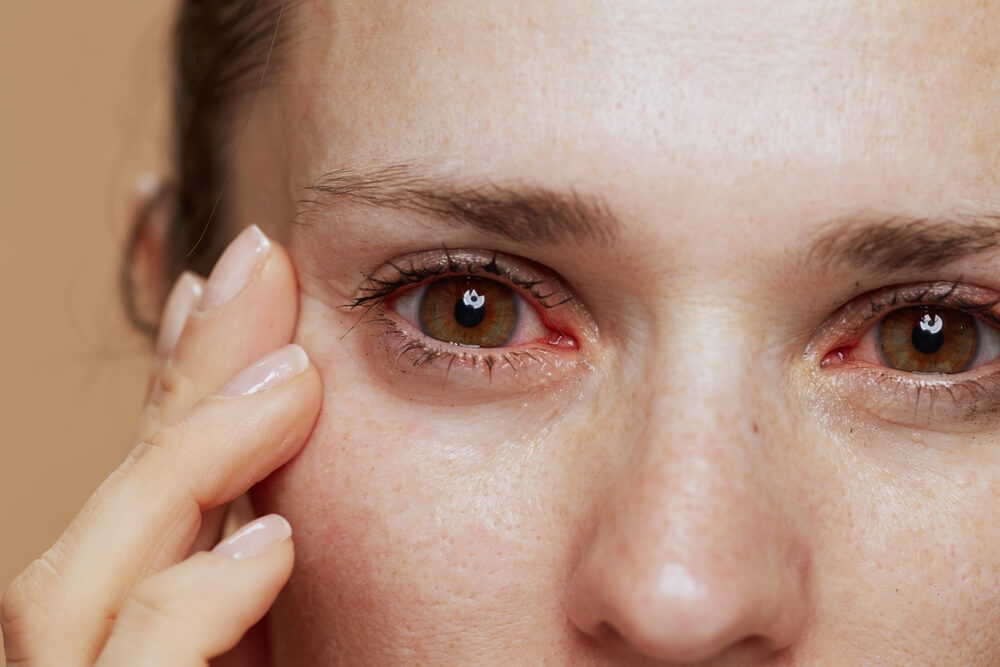Eye allergies, scientifically referred to as allergic conjunctivitis, can cause substantial discomfort and negatively impact the quality of life of numerous individuals. This ocular condition arises when the eyes come into contact with allergens, triggering an immune response. The most prevalent symptom of eye allergies is the occurrence of itchy red eyes. The persistent itching sensation often compels affected individuals to rub their eyes vigorously, potentially leading to further irritation and damage.
Alongside itching, individuals may experience additional distressing symptoms, including excessive tearing, swelling, redness, and a sensation akin to grit or burning. Swift identification and appropriate treatment of these symptoms play a crucial role in providing relief and preventing potential complications associated with eye allergies. By understanding the reasons behind itchy red eyes, as well as the triggers and available management options, individuals can take proactive measures to alleviate discomfort and enhance their overall eye health.
Understanding Eye Allergy Symptoms
Eye allergies can manifest in various ways, with itchy red eyes being a prominent and bothersome symptoms. The relentless itchiness can become increasingly intense, prompting individuals to rub their eyes in search of relief frequently. However, this repetitive rubbing can potentially lead to further irritation and damage to the delicate eye tissues. In addition to itching, eye allergies often present with a range of accompanying symptoms. These may include excessive tearing, swelling of the eyelids, redness, a gritty or sandy sensation in the eyes, and a burning or stinging feeling. Some individuals may also experience blurry vision or sensitivity to light during episodes of eye allergies. Recognizing and understanding these symptoms is vital for prompt diagnosis and appropriate management of eye allergies. By seeking timely medical attention and adhering to recommended treatment strategies, individuals can alleviate discomfort, minimize the impact on daily life, and safeguard their ocular health. It is important to remember that persistent or severe eye allergy symptoms should always be evaluated by a healthcare professional to rule out any underlying complications. Contact Allergy & Immunology Center to consult experts about your difficulties.

Exploring Eye Allergy Triggers
A diverse range of allergens can trigger eye allergies, and understanding these triggers is essential for effective management and prevention. By identifying the specific substances that provoke allergic reactions in the eyes, individuals can take proactive steps to minimize exposure and reduce symptoms.
Pollen, a common culprit, is prevalent during certain times of the year and is a significant trigger for seasonal eye allergies. The microscopic particles released by trees, grasses, and weeds can easily enter the eyes, causing irritation and an immune response. Dust mites, another common trigger, thrive indoors and can trigger year-round eye allergies. Their tiny fecal matter and body fragments become airborne, leading to allergic reactions when inhaled or in direct contact with the eyes.
Pet dander, derived from skin flakes, saliva, and urine of animals, is another prominent trigger for eye allergies. Even if you don’t have pets yourself, dander can be present in public spaces or cling to pet owners’ clothing, potentially causing symptoms upon exposure. Mold spores, commonly found in damp and humid areas, can also provoke eye allergies. When inhaled or made direct contact with the eyes, these spores can trigger an allergic response.
In addition to specific allergens, environmental irritants can exacerbate eye allergy symptoms. Cigarette smoke, air pollution, and strong odors can irritate the eyes and worsen existing allergic reactions. Individuals with eye allergies should be aware of these irritants and take measures to minimize exposure.
Reasons for Itchy Red Eyes
The primary cause of itchy red eyes in allergic individuals is the body’s immune response to allergens. When the eyes come into contact with these substances, mast cells in the eye tissues release histamine, leading to an inflammatory reaction. This inflammation causes itching, redness, and other allergic symptoms. Different allergens can have varying effects on the eye tissue, resulting in varying degrees of itchiness and redness.
Diagnosis and Treatment Options
If you suspect you have eye allergies, seeking medical advice from an allergist or immunologist is recommended. They will perform a comprehensive evaluation and may conduct diagnostic tests to confirm the presence of eye allergies. Treatment options for eye allergies include medications such as antihistamines, mast cell stabilizers, and nonsteroidal anti-inflammatory drugs (NSAIDs). These medications help alleviate symptoms and manage the inflammatory response. In some cases, decongestant eye drops or immunotherapy (allergy shots) may be prescribed. Implementing home remedies and self-care measures, such as using cold compresses or avoiding allergen exposure, can also provide relief.
Lifestyle Modifications for Eye Allergy Management
Making certain lifestyle modifications can help manage severe eye allergy symptoms more effectively. Minimizing exposure to allergens by keeping windows closed, using air purifiers, and regularly cleaning surfaces can reduce allergen levels in the environment. During high pollen seasons, staying indoors during peak pollen times and wearing sunglasses can provide added protection. Individuals who wear contact lenses should follow proper hygiene practices and consider switching to daily disposable lenses. Practicing good eye hygiene, such as washing hands frequently and avoiding rubbing the eyes, can also help alleviate symptoms.
When to Seek Medical Attention
While most eye allergy symptoms can be managed with appropriate treatment and lifestyle changes, it’s important to recognize when medical attention is necessary. Persistent or severe eye allergy symptoms that do not respond to over-the-counter remedies may require professional evaluation. In rare cases, eye allergies can lead to complications such as corneal abrasions or secondary infections. If symptoms worsen or if there are signs of a severe allergic reaction, such as difficulty breathing or swelling of the face, immediate medical care should be sought.

Conclusion
In conclusion, eye allergies, with their most common symptom of itchy red eyes, can significantly disrupt an individual’s daily life and overall well-being. By understanding the underlying causes, identifying triggers, and implementing effective management strategies, individuals can find relief and regain control over their ocular health.
It is important to remember that seeking professional medical advice from an allergist or immunologist is crucial for accurate diagnosis and personalized treatment plans. These healthcare professionals can conduct comprehensive evaluations, perform diagnostic tests, and prescribe appropriate medications to alleviate symptoms and manage the inflammatory response.
Moreover, lifestyle modifications play a vital role in managing eye allergies. Minimizing exposure to allergens through proper cleaning, using air purifiers, and adopting protective measures during high pollen seasons can significantly reduce symptoms. Good eye hygiene practices, such as avoiding eye rubbing and practicing regular hand washing, are also essential for symptom relief.
While most eye allergy symptoms can be effectively managed, it is important to be aware of when to seek medical attention. Severe or persistent symptoms that do not respond to over-the-counter remedies should be evaluated by a healthcare professional. Additionally, any signs of a severe allergic reaction, such as difficulty breathing or facial swelling, require immediate medical care.
In conclusion, by staying informed, proactively managing triggers, seeking appropriate medical care, and adopting healthy lifestyle habits, individuals can minimize the impact of eye allergies and improve their quality of life. Remember, your eyes deserve the utmost care and attention, and addressing eye allergies promptly is a vital step toward maintaining optimal ocular health and well-being.


